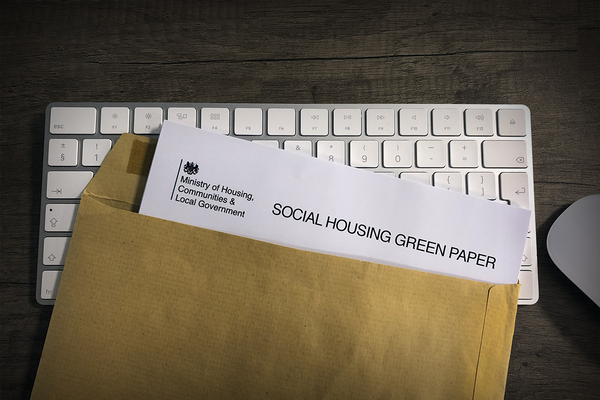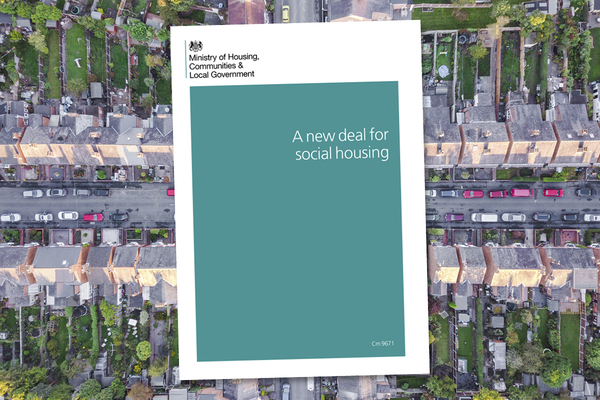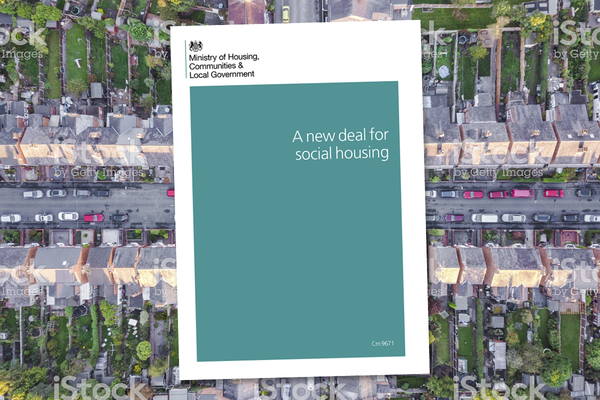You are viewing 1 of your 1 free articles
Government should focus on building on what’s already strong
Philippa Jones considers the Social Housing Green Paper through a slightly different lens
When the government published its Social Housing Green Paper last week, I happened to be reading some blogs about community by Cormac Russell. For those of you who haven’t come across him yet, Mr Russell is a faculty member of the ABCD Institute and regularly explores themes around building on ‘what’s strong’ instead of parachuting in to fix ‘what’s wrong’. And it was through this lens that I approached the new proposals for our sector.
In one of his most recent commentaries, he challenges readers to imagine how different things would be if well-intentioned helpers took care to first discover:
- The informal ways communities sustain themselves
- The informal ways that things get done in a community and the stories that reveal the quiet and invisible ways residents make a difference
- How different cultures get along and have come to understand each other
- How people naturally and competently produce care, health, safety, sustainable foods, raise their children, care for their environment and nurture their local economy
He also challenges the good intentions of professionals whose risk-based practises and efforts to keep people safe actually separate them from natural support networks and make them less autonomous and more dependent on salaried strangers. The context is social workers, but could equally apply to housing professionals.
So, how do the five principles set out in the green paper feel when viewed through this lens?
1. Ensuring homes are safe and decent
The green paper notes that: “The Decent Homes Standard has not been revised since 2006, so we believe it should be reviewed to consider whether it is demanding enough and delivers the right standards for social housing alongside other tenures. The standard could also be updated to reflect government’s current and forthcoming priorities.”
The standard certainly needs updating but surely a more constructive idea would be to reflect what residents want rather than the government’s own priorities?
2. Effective resolution of complaints
Once residents need to raise formal complaints we are into fixing what’s wrong, so it’s probably too late to use the ‘build on what’s strong’ lens. I think all of us would agree that we can get better at resolving complaints more quickly and effectively so we can focus on the more useful proactive relationship with the people living in our homes.
3. Empowering residents and strengthening the regulator
“Driven by the priorities of social residents, it will empower them by giving them greater control over their lives and homes,” states the consultation document.
Mr Russell suggests public service agencies should measure success on the basis of how interdependent within their communities people have become, not how dependent on professional support they are.
“Is professionalisation necessarily the answer? We certainly want colleagues to behave ‘professionally’... but is that behaviour specific to the housing profession?”
The green paper asks us to respond on: “What is needed to further encourage the professionalisation of housing management to ensure all staff deliver a good quality of service?”
But is professionalisation necessarily the answer? We certainly want colleagues to behave ‘professionally’, be trustworthy and treat people with respect – but is that behaviour specific to the housing profession?
When we at Bromford moved to our neighbourhood coaching model with much smaller patches we needed to recruit externally.
These very flexible and autonomous roles attracted people from teaching, police, social work, financial services and retail – and we were delighted to bring in this rich range of skills from other professions who all demonstrate these core human behaviours.
4. Tackling stigma and celebrating thriving communities
The green paper says: “We want to celebrate the role of residents in shaping fantastic places by recognising the best neighbourhoods. Awards could include investment to support successful initiatives to grow, or funding for an event or a street party to bring people together across housing tenures and generate a sense of pride. How could we support or deliver a best neighbourhood competition?”
This idea clearly comes from the right place – like all the good intentions Mr Russell warns us about. If a community wants a street party, it would certainly be nice if there was a local pot of money they could access to support their own efforts. But does that have to mean proving that they are either needier or more brilliant than any other neighbourhood? This feels a little bit too much like government playing Lady Bountiful judging the deserving poor.
5. Expanding supply and supporting homeownership
The green paper “underlines this government’s commitment to fixing our broken housing market and getting more people on the housing ladder”.
It’s at this point I feel we reach a real disconnect with these proposals – how can we possibly start addressing the stigma of social housing if this same green paper suggests that everyone should be aiming to bounce out of it and into the nirvana of homeownership?
So, what would be the overall verdict on the green paper be if viewed through this lens? Perhaps that it focuses too much on fixing what’s wrong and risks centrally prescribing ways of engaging with residents and addressing their complaints. Government policy needs to enable more building on what’s strong – actually building more great social homes and real relationships with the individuals and communities who live in them.
Philippa Jones, chief executive, Bromford Group
Social Housing Green Paper: full coverage
All our Social Housing Green Paper coverage in one place:
Green paper measures are not enough to create May’s ‘new generation’ of council homes Green paper proposals are welcome but much more is needed to support councils to build, writes John Bibby
Green paper shows ministers now see associations as trusted partners Focusing on the failure of the green paper to address supply misses the point, writes Boris Worrall
Government should focus on building on what is already strong Philippa Jones considers the Social Housing Green Paper through a slightly different lens
We need more than a week of delayed announcements bundled together Jules Birch reflects on the government’s ‘Housing Week’ announcements
The regulator should monitor how associations assist homeless people Government announcements this week are positive, but any enhanced role for the English regulator should include looking at homelessness prevention work, argues David Bogle
The regulator’s role should be limited to dealing with systemic failures Julian Ashby suggests the Housing Ombudsman Service should deal with all complaints
The green paper shows ministers are in listening mode Despite some glaring omissions, the government appears to be in listening mode and it is important the sector takes advantage, argues Emma Maier
A short history of social housing league tables Attempts to create league tables for housing associations are nothing new. Mervyn Jones looks at how they have worked in the past
League tables could prove blunt and counter-productive, sector warns Housing figures criticise government proposals to measure social landlords against performance indicators
Government ‘must decide how proactive regulator should be’ on consumer standards Ministers now face a dilemma over the regulator’s focus, sector figures say
The Green Paper: a golden opportunity missed? Melanie Rees assesses the Social Housing Green Paper against recommendations drawn up by the Chartered Institute of Housing and finds the government comes up short
Longer strategic partnerships and guranteed debt to boost social housebuilding The Social Housing Green Paper outlines key ways of boosting supply
The green paper is remarkable progress but it is still not enough The green paper suggests the government appears to be re-writing much of its policy since 2010, but more needs to be done, writes Jules Birch
Green paper marks a ‘milestone’ on resident involvement The government’s recognition residents need clear information is to be welcomed, now it up to the sector to embrace tenant involvement, writes Paul Hackett
Ministers consider stock transfer programme to community-led associations The stock transfer programme could be revived under proposals in the housing green paper
Access to housing grant could be tied to new league tables Grant could be awarded according to how well landlords meet performance indicators, the paper suggests
Ofsted-style regulation of tenant services proposed The government is considering expanding the Regulator for Social Housing’s remit to intervene over tenant services and give it a more “proactive approach to enforcement”
Government proposes dropping one-for-one Right to Buy replacement commitment A consultation paper published alongside the green paper proposes a broader measurement to replace the one-for-one pledge
A list of recent housing policy U-turns The green paper confirms yet more housing policy U-turns from the government, which has spent the past two years dropping policy ideas developed under the David Cameron government. Here is a rundown of the major changes in policy direction
Sector welcomes green paper but calls for more ‘ambitious investment’ Reaction to the proposals, from the National Housing Federation, Chartered Institute of Housing and more
Morning Briefing: reaction to green paper announcements how the media reported the proposals trailed by the government overnight
Government drops plans to force councils to sell higher-value stock The government drops plans to force councils to sell higher value homes
League tables and ‘sharper teeth’ for regulator in social housing green paper Ministers reveal some of the things in the paper ahead of its publication
Grenfell survivors: green paper does not go far enough survivors of the Grenfell Tower fire have said the measures published in the Social Housing Green Paper do not do enough to rectify issues in the social housing sector
KEY PROPOSALS IN THE SOCIAL HOUSING GREEN PAPER
- New 'league tables' of housing providers based on key performance indicators, surrounding services such as repairs and neighbourhood management. This could be linked to housing grant.
- Consideration to scrapping of the current 'serious detriment' test, to allow 'Ofsted-style' tougher consumer regulation
- New home ownership options such as allowing tenants to buy as little as 1% of their property each year through shared ownership. This would only apply to new shared ownership purchases.
- Ditching of plans to force social landlords to offer fixed term tenancies rather than lifetime tenancies in social housing
- Ditching of plans to force councils to sell off their most valuable social housing when it becomes vacant
- The potential introduction a new stock transfer programme from councils to 'community-led' housing associations
- The return of guaranteed debt funding to help the development of affordable homes, and longer term 'strategic partnerships' for developing housing associations












